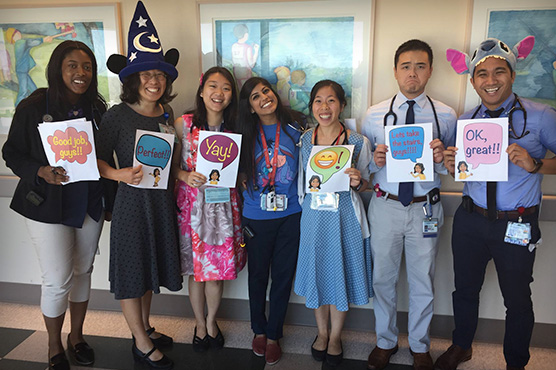Belonging, Community, and Inclusive Excellence
We are dedicated to belonging, community, and inclusive excellence in pediatric health.


We acknowledge that our physical plants are on the tribal lands of the Sacramento area’s Indigenous people which include: the Nisenan, the Southern Maidu to the North, the Valley and Plains Miwok/Me-Wuk to the south of the American River, and the Patwin Wintun to the west of the Sacramento River.
Photo credit Erik Fernández y García
Pediatrics Committee on Belonging, Community, and Inclusive Excellence in Pediatric Health
Our Mission and Purpose
The interrelated, dual missions of the Department of Pediatrics Committee on Belonging, Community, and Inclusive Excellence in Pediatric Health are:
- To guide departmental structures, policies, and practices to improve departmental workforce to reflect the children it serves
- To assure that all of the children served by UC Davis Health have the same opportunity to be as healthy as possible and receive excellent pediatric health care
These missions are symbiotic, each arising from and supporting the other.
The Department of Pediatrics stands behind its dedication to creating a healthy future for all children. It logically follows that we ground our intertwined missions in the American Academy of Pediatrics (AAP) Statement on “Health Equity and Children’s Rights.” The AAP statement defines four elements of child health equity:
- Children’s rights
- Social justice
- Human capital investment
- Child health equity ethics
Operationalizing guideline-based strategies, the Committee will simultaneously address each of these four elements to ensure the fulfillment of our missions.
We envision a Department of Pediatrics...
...whose staff, residents, and faculty have backgrounds that reflect the children it serves and where that is celebrated and supported. We envision UC Davis Health and the Department of Pediatrics both being committed to engaging, with humility, all of the communities of the Sacramento region to ensure equity in the healthcare we deliver and in the overall health of communities.
Belonging, Community, and Inclusive Excellence Grant Applications
In efforts to continue to promote Inclusive Excellence, Sense of Belonging, and Thriving Climates for all, the Committee on Belonging, Community, and Inclusive Excellence in Pediatric Health supports ongoing professional development and scholarly activity for Medical Students, Residents, and Fellows who pursue opportunities for academic leadership in child health advocacy, neighborhood partnerships, and pediatric health equity within healthcare, healthcare workforce, and the clinical practice of medicine. Learn more about how your scholarly activity and professional development in these areas can be supported by our committee.
- 2024-25 Medical Student Scholarly Activity Leadership Grant
- 2024-25 Pediatric Resident/Fellowship Scholarly Activity Leadership Grant
- 2024-25 Pediatric Resident/Fellowship Professional Development Leadership Grant
Please download, save, complete, and send to lkester@health.ucdavis.edu
-
Guiding Principle 1
Children’s Rights
We will seek to employ the antiracism strategies provided in the American Academy of Pediatrics Statement “The Impact of Racism on Child Health and Adolescent Health” to maintain the rights of all children served by the Department of Pediatrics and serve as a model for the Sacramento region.
-
Guiding Principle 2
Social Justice
We will use theory and evidence-based models to attempt to establish the Department as a national leader in developing and promoting best practices to ensure the wellbeing of all children in a community, starting with the greater Sacramento community which we serve.
These models include the UNICEF Child Friendly City Initiative and the All Children Thrive Initiative.
-
Guiding Principle 3
Human Capital Investment
Developing and sustaining a workforce which reflects the community it serves requires investment from the Department of Pediatrics. Such a workforce serving children is itself a human capital investment in pediatric health equity. To that end, we will collaborate with the UC Davis Health Office of Health Equity by Design for Inclusion Excellence and Office of Medical Pathways to guide the Department Chair, Division Chiefs, and Pediatric Residency and Fellowship Program Directors in employing strategies to recruit, support, and retain, staff, residents, fellows and faculty to meet this goal.
We will work with the UC Davis Health Office of Inclusion Excellence to guide the Department Chair and Division Chiefs in ensuring that faculty have ample opportunities for career advancement and leadership positions. We will use participation in the Committee itself (collaborating with the Department of Pediatrics Wellness Committee) by faculty, residents, and staff as a tool to support those participants, by providing a safe environment for discussion and mentoring around issues particularly relevant to inclusive excellence.
-
Guiding Principle 4
Health Equity Ethics
Guided by the principles of Cultural Humility, we will engage bi-directionally with community leaders to assist the Department of Pediatrics in meeting the healthcare needs of all children, especially the most vulnerable. Having community participants on the Committee is itself a powerful community engagement goal, in addition to specific projects that arise from the Committee. Project ideas will be initiated by community members on the Committee with support of the other community members.
Our committee will provide the Department of Pediatrics and others who want to participate educational opportunities through Grand Rounds and the CHAANJE Lives curriculum.
- Please watch Connecting Neighborhood Health and Childhood Health, a Grand Rounds presented by Jesus Hernandez, Ph.D., which provides a historical context for pediatric health equity in Sacramento neighborhoods.
-
Email Committee
The committee is a multidisciplinary one with members including staff, graduate trainees (residents), and faculty from UC Davis Department of Pediatrics, as well as community members. All members of the committee have full and equal say in committee procedures and activities.

